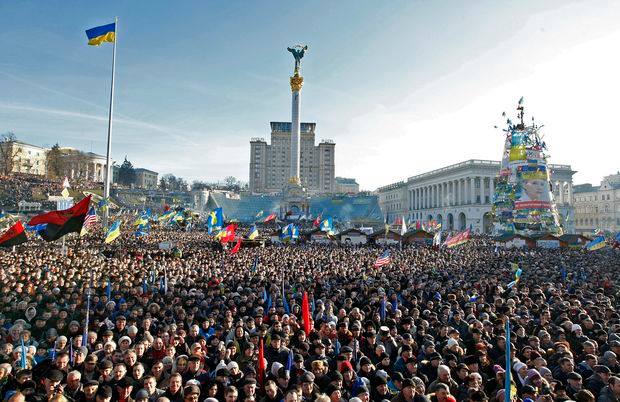Anniversaries are occasions for recalling the past and thinking about the future, and they are especially instructive about both when two or more of them occur at the same time. That is the case this weekend when Ukrainians mark the second anniversary of the Maidan and Russians take note of the third anniversary of Putin’s “foreign agents” law.
The first provides an occasion for reflecting on just how far Ukraine, with all its problems domestic and foreign, has moved beyond being a former Soviet republic, and the second provides one for thinking about just how little progress Russia, despite all its resources and other advantages, has made in that regard.

Two commentaries on the former event and one about the latter are particularly valuable.
In Kyiv’s “Novoye vremya,” Irina Bekeshkina, a Ukrainian sociologist, says Ukrainians are now asking themselves whether the Maidan “won or lost;” but she suggests that the most important result is that civic activity has not “’demobilized’” and therefore continues to play a role.
The number one demand of those who came to the Maidan was achieved: the departure of Yanukovych and new elections for the Verkhovna Rada and the presidency. But two other demands, a struggle against corruption and the punishment of those responsible for repression against the Maidan, have not.
In part, this recalls the situation after the Orange Revolution when those in office changed but these goals were left unachieved. “However,” Bekeshkina writes, “there is one distinction” and that is the continuing “active civil society” now.
After 2004, Ukrainians turned away from politics and assumed that their new leaders would take care of everything. But after 2013, “no one places particular hopes on the powers that be. More than that, people are very disappointed in it. Happily, by the common efforts of civil society and Ukraine’s Western partners, the changes the country needs are moving forward.”

A second article, this one by Moscow commentator Yevgeny Ikhlov, is even more upbeat on this anniversary about Ukraine, arguing that that country has “ceased to be post-totalitarian and post-Soviet” and is on the way to becoming a normal European country.
Ukraine has gone through a number of revolutions over the past 25 years, Ikhlov argues, but after the latest one, “it has not degenerated into nomenklatura fights as in 2006 and has not displayed either Jacobean or nationalist hysteria” as some countries in Eastern Europe did in the early 1990s.
Instead, he writes, “a bilingual political nation has been born, not bad laws have been adopted, and a normal East European system of parties has been restored.” In short, “Ukraine has ceased to be a post-totalitarian and post-Soviet country” and moved toward becoming a normal European one.
Moreover, over the last two years, Ikhlov says, “Ukraine has withstood Russian aggression and created a not bad army. In this, it recalls France of 1793, but without the guillotine and civil war.” But most important, “Ukraine has become a state where civil society is stronger than the government but without the Weimar Syndrome.”
Not surprisingly, the third anniversary of Putin’s “foreign agents” law is being marked less in Russia where the Kremlin leader’s actions have made that increasingly difficult but rather abroad where many Russian activists have either taken refuge or made use of the freedoms there that they no longer have at home.

In an interview this weekend with Radio Poland, Elena Shakhova, the head of the Civic Control rights organization in Russia, says that over the last three years, more than 100 NGOs have fallen under the provisions of Putin’s law and both they and Russia have suffered as a result.
In response to the repression which the Kremlin has visited on NGOs and Russian society and on the occasion of this anniversary, her group has launched an Internet project called Human Rights Agents so that Russians can know what is going on in a sector that Putin has used his control of the media to demonize.
Shakhova who has been working in human rights groups since 1998 said that in her memory, there had “never been such a level of repression against civil society” in Russia as there is now. Not all of that, of course, is connected with the foreign agents law; but much of it is. And she concluded that “we will continue our struggle” because “truth is on our side.”




